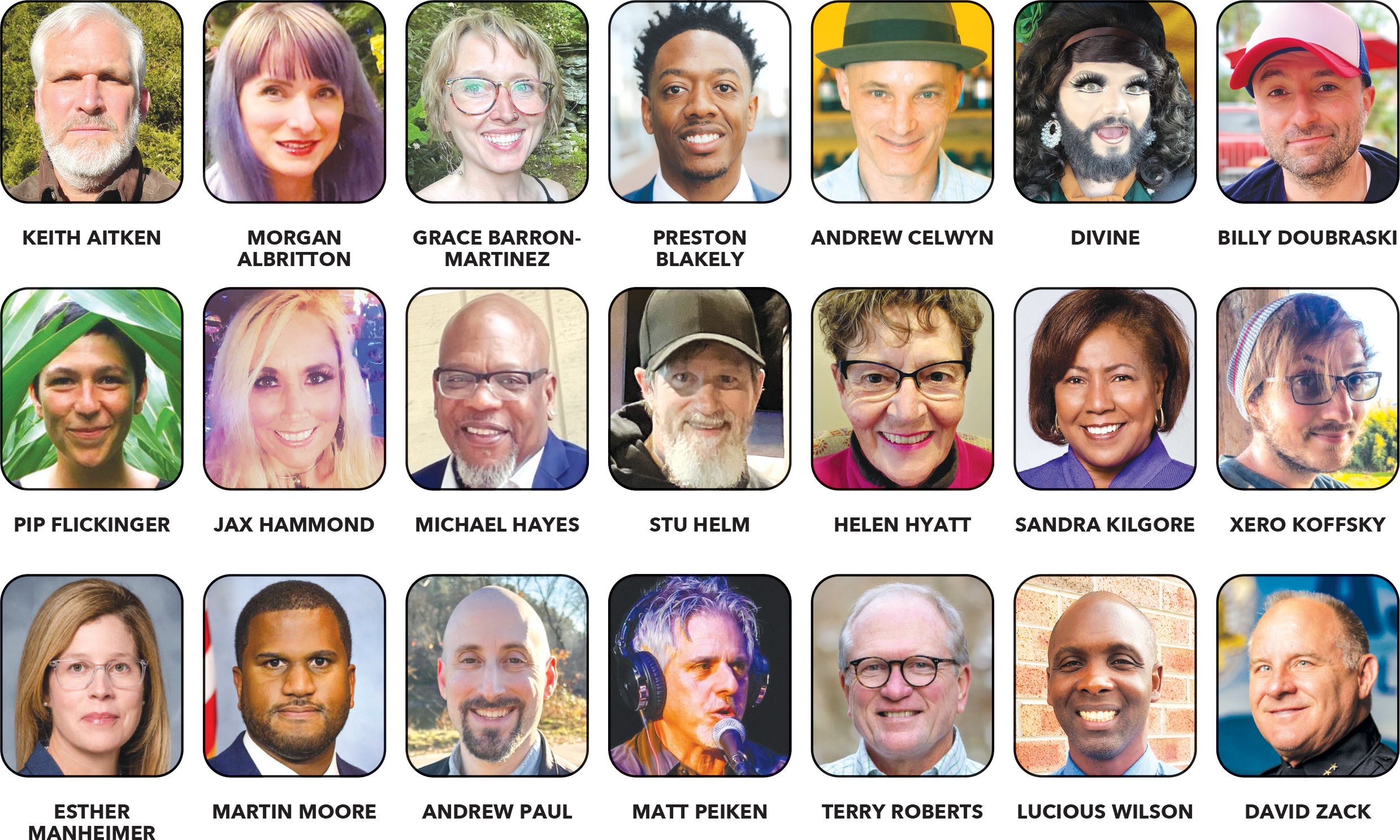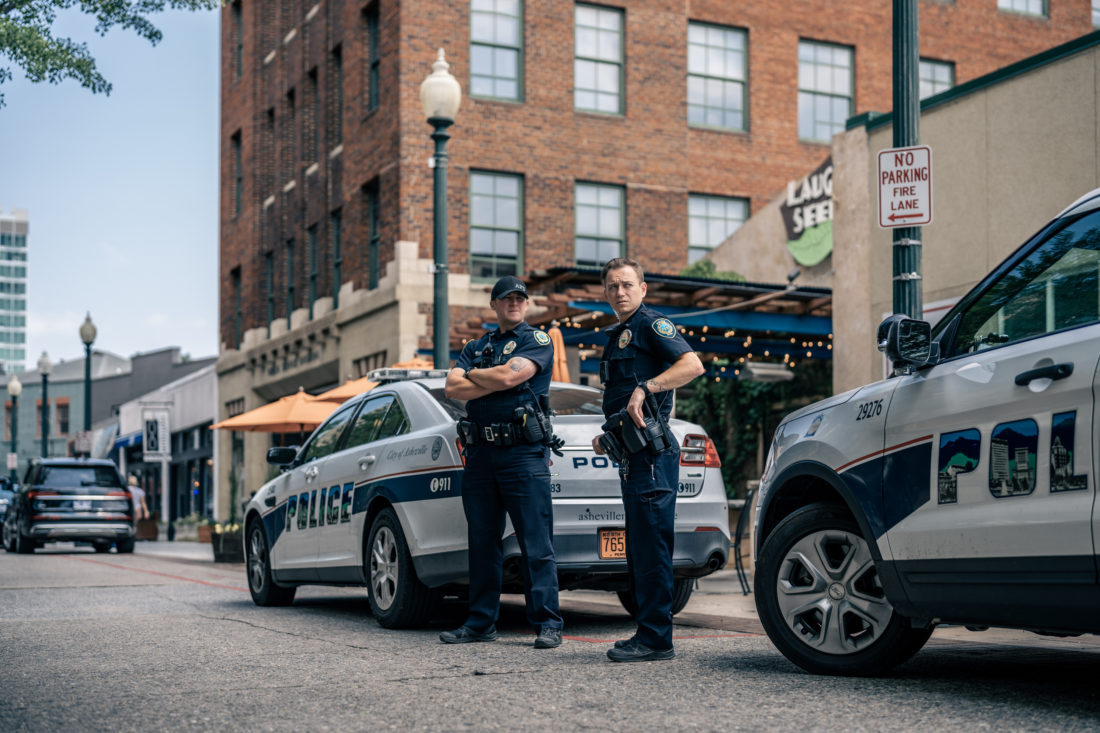Crime and public safety have long been topics of keen interest in Asheville. But throughout 2023, they were on the minds of many local residents in unusually amplified ways.
Asheville Watchdog‘s 12-part “Down Town” series shed light on the myriad issues impacting the central business district, reporting that attracted the attention of Fox News, which painted Asheville as a city “plagued with rising violent crime.” Whether the national coverage led to decreased sales at local businesses during the summer was among subsequent debates reported by Watchdog. Meanwhile, portions of the city’s 60-day downtown safety and cleanliness pilot transitioned into ongoing services in hopes of addressing numerous urban woes.
To help see the bigger picture on the past year in public safety, Xpress checked in with some local notable figures whose work and lives intersect with the topic’s various aspects.
What do you think are the main drivers for crime in our area in 2023, and how have local governments responded to it?
“If you look at the poverty level in Asheville, where crimes are taking [place] and who is committing those crimes, the common denominator is poverty. Our local governments might be doing the best they can, but this is a nationwide problem that has to have a different and alternative approach to handling these types of situations.” — Michael Hayes, executive director of Umoja Health, Wellness and Justice Collective
“The decrease in COVID dollars from the government is one factor increasing poverty and, in turn, crime. The opioid epidemic is also increasing crime as people get desperate and do things they might not normally do.” — Andrew Celwyn, former board member, Buncombe County Tourism Development Authority
“For certain, crime is driven by inequality, alienation, scarcity and segregation. Asheville has all of these things. Local governments can only do so much — Raleigh has made sure of it. I think there’s a tendency among Asheville residents to blame outsiders for our problems, and I’d love to see our local governments ask us to take a harder look at ourselves. At least some of the aforementioned problems are of our own creation.” — Andrew Paul, lead organizer, Asheville For All
“Heat and density. There have been studies that suggest crime decreases as the canopy increases. Asheville has responded by hiring a dedicated individual to … work with all citizens to improve their understanding and conservation of the natural environment that surrounds us all.” — Keith Aitken, urban forester, City of Asheville
“Crime is complex and multifaceted, and drivers can be related to … a multitude of social, economic, psychological and other factors. Whether it be substance abuse disorder, experiencing homelessness, low wages [and] high cost of living, among other issues — these items all have the potential to contribute to crime. We have been fortunate to have a low crime rate in Fletcher. However, we all need to figure out how we can collaborate to support our most vulnerable population so that they may exist in a happy, healthy and safe community.” — Preston Blakely, Fletcher mayor
Do you feel more or less safe than you did at the start of the year?
“I’m feeling as safe as a chicken in a fox den, toting mace and hiring security for our shows. That’s a first. The queer scene is a whole new rodeo with national drag bans and laws targeting our transgender family. Having been harassed like a raccoon in a trash can a few times, I’ve had police escorts and one show turned into a real protest. Other performers have their own tales. It’s real.” — Divine, producer, Bearded Lady Productions
“I feel more safe downtown than at the start of the year due to increased police presence on the street and less unhoused people laying on the pavements.” — Helen Hyatt, activist and South Asheville resident
“I feel as safe most places in Buncombe County as I did at the start of the year. What has changed for me are the steadily increasing crowds of people in downtown Asheville, especially during ‘tourist season’ and especially on weekends. Crowds of (occasionally inebriated) tourists juxtaposed with our homeless population is a recipe for trouble. But I grew up visiting Asheville starting in the 1970s, and downtown at night has always been edgy.” — Terry Roberts, author
“Honestly, I feel no different than I did at the beginning of the year. 2023 felt like it had just started, then I blinked and we are about to be in 2024. So, no real noticeable change.” — Xero Koffsky, junior at Warren Wilson College
“Our city continues to prosecute activists engaged in mutual aid with the ‘felony littering’ charges and arrest of journalists in Aston Park. We’ve increased surveillance with systems like Fusus and multiple new drones that hover over protests or even at a local bookstore’s opening. In a time when so many of our civil rights are under attack, criminalizing the ability to dissent is inherently unsafe.” — Grace Barron-Martinez, activist and Realtor
Should addressing panhandling be a priority for local government?
“Panhandling is legal here in Asheville, although it is regulated. However, even after reading the regulations in their entirety twice, I’m still not 100% clear on where and when panhandling is allowed, so I wish the rules were a little more clear, and then it would be easier to determine whether or not the city is doing a good job enforcing the regulations.” — Stu Helm, food blogger and food tour guide, Stu Helm Food Fan
“I am not a fan of panhandling but I do not have a problem with it. There is a group of people that hang out at the 240 exit onto Haywood Road coming from downtown. They seem to have a system and are always polite and respectful. These people are not a problem. People that scream obscenities and follow you down a street, however, are a problem.” — Lucious Wilson, board member, Buncombe County Tourism Development Authority
“Yes. I view panhandling as a cry for help from our most vulnerable community. We must ensure our outreach is adapted to the various needs such as substance abuse, food and shelter. We must also be pragmatic — resources are needed to help support the many services that we provide for the community. In doing so, we must use the laws we have available to enforce the violations and offer assistance when necessary. Enforcement is also needed to prevent bad actors (aka professional panhandlers) from taking advantage of the community.” — Sandra Kilgore, Asheville vice mayor
“Addressing the source of panhandling should be the priority. Why are there so many homeless/houseless and dangerously addicted individuals in Asheville now, yet property taxes keep going up?” — Jax Hammond, creator, Visit Asheville (For Tourist and Locals!) and Asheville Quarantine Community Facebook groups
“It should be addressed for the comfort and safety of both the panhandler and the citizens or tourists they are appealing to. I think people want to help, and perhaps there is a way to do so and get those resources in the hands of the folks who need the help so they would not have to stand along the side of the streets or highways and could be out of potential harm’s way.” — Billy Doubraski, East West Asheville Neighborhood Association board member
“I’ve noticed a definite decrease in panhandling in the West Asheville area where my store is located since summer ended. We and our nearby neighbors chose to sign a petition to increase the watch of authorities, along with our addition of ‘No Trespassing’ signs. It’s a joint effort from multiple neighboring businesses.” — Morgan Albritton, owner, Morgan’s Comics
Has community support for law enforcement changed since the start of 2023?
“There has definitely been a ‘swing of the pendulum’ from 2020 to 2023. We are no longer hearing cries to ‘defund’ or reduce the size of the Police Department. In fact, from our business community to our residential community — be they affluent or underserved — we are hearing requests for increased presence. I believe this indicates that confidence and trust are improving between APD and our community.” — David Zack, former Asheville Police Chief, 2020-23
“I’ve seen an uptick in media reinforcement and public support for using arrests to address our housing crisis. Ample evidence shows this approach doesn’t work and causes harm, including greatly increasing how long people are on the streets. Personally, I know multiple people who lost upcoming housing due to the recent waves of nuisance crime arrests. Continuing to use the same broken tools we have been using only digs us deeper into the hole.” — Pip Flickinger, outreach worker
“Recruitment and retention have been an acute challenge for the Asheville Police Department. The approval of a 6% salary increase for existing APD employees, a wellness incentive pilot program and additional pay for intermediate law enforcement certification has been met with great support by our community.” — Esther Manheimer, Asheville mayor
“I’ve noticed the rise of local citizen groups, largely through social media, taking on a more conservative, combative tone to anyone critical of law enforcement. And these seem to be people who, at least before the Black Lives Matter protests, likely would have identified as liberal, or at least as Democratic Party voters. But these people have grown fearful and alarmed at the visible homelessness and mental illness on Asheville’s streets, and they decry the loss of a romanticized version of Asheville they believe has disintegrated through liberal city leadership. I think this shift could probably be traced back to 2022 and perhaps even 2021, but it has certainly grown in 2023.” — Matt Peiken, host, “The Overlook with Matt Peiken”
“I think our community is paying closer attention to what practices keep our community safe. I appreciate our conversations with our neighbors and the Buncombe County Sheriff’s Office’s focus on prioritizing violent crime. I’ve also heard significant community support for our co-response efforts, so I believe we’ll continue to see community support for effective law enforcement strategies and innovative approaches.” — Martin Moore, Buncombe County commissioner




The Police force in Asheville is a Joke. They want $186K in tax payer money but won’t even help their tax paying citizen. I’m a GM for a local business. We got robbed in broad daylight, while being in the building, and they wouldn’t even come out to take a report. But when one homeless person comes in to get a beer, makes a little noise and leaves on his own(we didn’t call 911 a patron did)…they will come out and ask a bunch of questions to go bother a homeless paying customer.